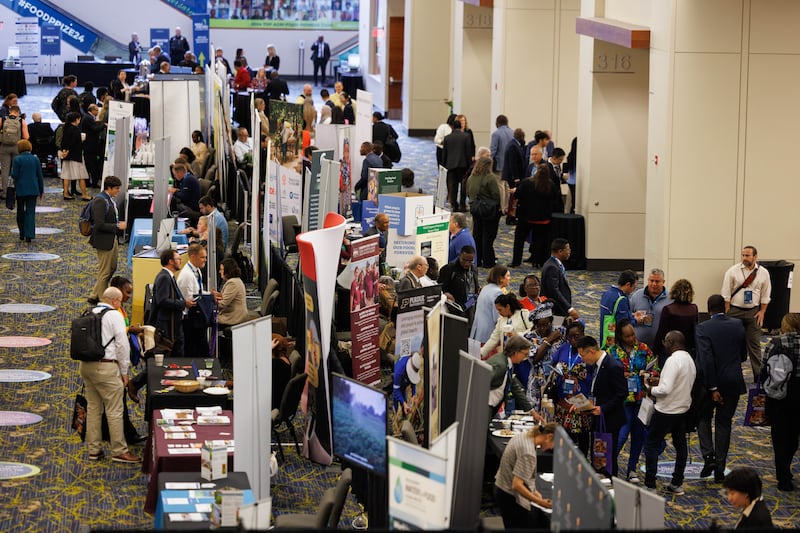DES MOINES, Iowa — Representatives with Humanitarian Services of The Church of Jesus Christ of Latter-day Saints recently participated in the World Food Prize Borlaug International Dialogue, an annual conference in Des Moines, Iowa, held in conjunction with awarding the World Food Prize.
The prize was conceived by Dr. Norman E. Borlaug, the 1970 Nobel Peace Prize laureate who saved hundreds of millions of lives through his work in agriculture. The World Food Prize honors individuals who have made significant and measurable contributions to improving the world’s food supply. This year’s laureates were Geoffrey Hawtin and Cary Fowler, honored for their work to protect biodiversity through crop genebanks and the Svalbard Global Seed Vault.
Since many sessions in this year’s conference from Oct. 28-31 focused on nutrition, the Church sponsored an information booth and hosted two side events, bringing together representatives from CARE International, Helen Keller Intl, iDE, Meds and Food for Kids, Save the Children, The Hunger Project and others to talk about the work they are doing in collaboration with the Church to improve nutrition for women and children in 12 countries.
These events showcased the impacts ranging from empowering local women farmers to overcoming cultural barriers to increasing iron and protein in a family’s diet and more. Most efforts focus on using local resources and knowledge, while adding new knowledge and assistance that will allow families to become self-sufficient and healthier.

Dana Smith, global nutritionist at iDE, explained the value of the initiative. “We have mostly focused on food systems, but this effort allows us to partner with groups like Helen Keller to connect to health systems in a new way. It is exciting to learn from new partners as we look for ways to reduce malnutrition in areas where we work.”
At each event, panelists shared how their organizational strengths, along with shared working values and transparencies, are allowing them to innovate with greater efficiency and scalability for long-term solutions. Mona Sherpa, Nepal country director for CARE, talked about the focus on women farmers and their efforts to provide them with access to financial and educational resources “to empower them with the ability to make their own decisions about what they grow, cook and eat.”
Ndeye Yaga Sy, nutrition policy and advocacy adviser at Helen Keller Intl Senegal, explained, “We have to work together to see the impact. If we want to change lives through nutrition and health, we have to combine our efforts.” This idea of cooperation is commonly known in the nonprofit world; however, the practice is much more difficult. The Church’s leadership role in facilitating intentional collaboration is both unique and appreciated.

Diana Kibugu, a 17-year-old student from Nairobi, Kenya, attending the conference as part of its Global Youth Institute, stopped at the booth because her research was about malnutrition in Nigeria. She was excited to learn more about existing efforts in Nigeria that could also help Kenya.
Citing the high percentage of children in Nigeria whose growth has been stunted by malnutrition, Kibugu said she hopes the problem can be solved because, with better nutrition, “people will be able to live in harmony and also there will be no conflicts, since there will be peace.”
This aligns with what Relief Society General President Camille N. Johnson has said about why the Church has a global initiative for women and children, including these remarks in June: “Global progress starts with nourishing children and strengthening women. When you bless a woman, you bless a family, a community, a nation. When you bless a child, you invest in the future.”
The Church has provided training materials and helpful information on its website childnutrition.ChurchofJesusChrist.org to better educate families about nutrition. A list of 25 ways to participate in the global initiative for women and children can be found at caring.ChurchofJesusChrist.org.


